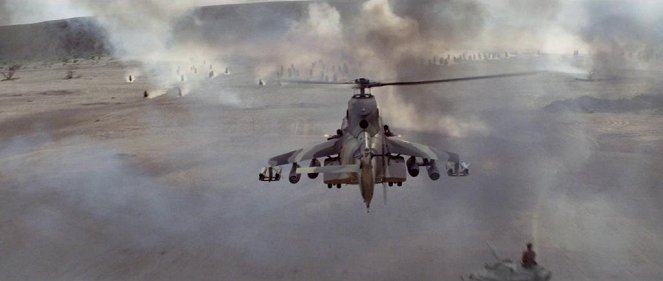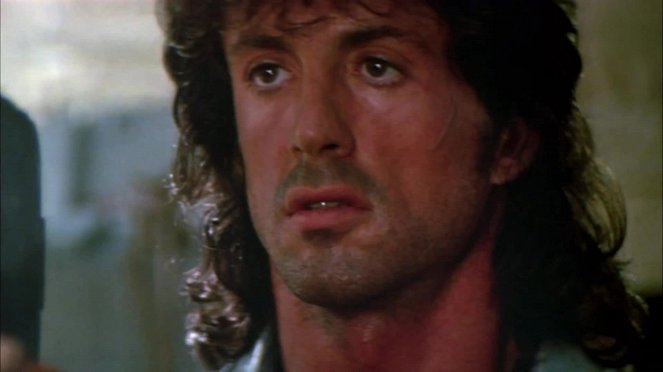Rendező:
Peter MacDonaldOperatőr:
John StanierZeneszerző:
Jerry GoldsmithSzereplők:
Sylvester Stallone, Richard Crenna, Marc de Jonge, Kurtwood Smith, Spiros Focás, Sasson Gabai, Doudi Shoua, Randy Raney, Marcus Gilbert, Joseph Shiloach (több)Tartalmak(1)
Trautman ezredes az afganisztáni háborúban az oroszok elleni tevékenysége miatt fogságba esik. Rambo kapja azt a veszélyes és minden eddiginél lehetetlenebbnek tűnő feladatot, hogy a front mögé kerülve, az oroszok által uralt területen felkutassa és kiszabadítsa a foglyul ejtett ezredest. A mindenre elszánt Rambo, az orosz területekre érkezve megtudja, hogy a Trautman-t egy megerősített erődben tartják. Ez a létesítmény első ránézésre bevehetetlennek tűnik: mindenhol állig felfegyverzett őrök figyelik a környéket és magát az erődítményt is. Ám Rambo-nak az éberségével sikerül bejutnia. Az azonban, hogy ki is kerül-e ebből a pokolból, erősen kétséges… (Mozi+)
(több)Videók (1)
Recenziók (10)
The quality drops and drops after episode one. So much this time that it is no longer possible to find anything that it might have in common with part one. Rambo’s third movie adventure is no longer an entertaining B-movie like part two, but more of a comic-bookish over the top ridiculous C-movie. This time, the heroic John Rambo takes on the Russians in Afghanistan and primarily he “finally" fight a duel with a helicopter. And how does he do it? You really don’t want to see. On the other hand, you really ought to want to see it.
()
Rambo III embodies the swan song of the eighties-style action movies in which the heroes checked guile and tactics at the door and righted the world’s wrongs through lethal brute force in seriously bombastic spectacles. A closer look at Stallone’s career shows that, unlike his main rival Arnold, Sly didn’t have much of a feel for trends or for the mood of the given time. And so in the same year when Arnold hit the cinemas with Red Heat, reflecting the policy of glasnost and combining a tough macho thriller with the one-liner-laden good humour of buddy movies, Stallone tried to wring the last drop out of the stale subject matter of the Cold War and raise awareness about a conflict that no one in the US cared about. On the other hand, the screenplay of Rambo III obviously takes into account the changes in the genre and thus enriches the relationship between the title protagonist and Colonel Trautman with a bit of banter, which was absent in the earlier Rambo movies and was clearly copied from Lethal Weapon. However, the film’s foundation remains entirely identical to that of its immediate predecessor, but with double the budget. With the franchise’s second and third instalments, Stallone presented what was, in his view, a universal recipe for resolving any military conflict, which for some fetishistic reason stubbornly involves a bow with explosive arrows and dispatching bad guys in a helicopter. I remember that in my boyish derangement, when I took all eighties movies deadly seriously, I thought Rambo III was the most amazing film of the whole trilogy, which certainly had something to do with the fact that I could project myself into the story as the hero’s adolescent sidekick. Today, I still think that it’s the best of the Rambo movies, albeit solely from a cringe perspective. Jesus Christ, the film is perfection itself – from the well-made actions sequences and the imbecilic naïveté of the militaristic agit-prop to the hero who is so sullenly ridden with existential angst that he is totally cool with his permed hairdo. And on top of that, there are of course screenwriting gems like the dialogue about the blue light. It’s impossible not to believe the rumours that everyone but Stallone knew they were making a complete clusterfuck of a movie and so that’s how they approached it. But it’s a shame that the director originally attached to the project, Russell Mulcahy, made that fact too obvious and was thus fired. Because if it had been directed by that frantic music-video formalist, who made the phenomenal '80s exercises in excess Razorback and Highlander, Rambo III would have been the apex of camp. _____ Side note: The main obstacles in Stallone’s career have been his ambitions as an actor and the fact that he has always taken himself too seriously. Until the mid-1980s, when he finally reconciled himself to the action-hero image and, unfortunately, also completely succumbed it, his filmography was characterised by a regular trend of following every (essentially surprising and outsider) hit with several futile and money-losing attempts to show a broader range as an actor. Thanks, on the other hand, to the “talented actor” label that was successfully attached to him by the PR myth around the first Rocky, Sly was still considered a bigger star than Arnold for a significant part of the eighties. Schwarzenegger only gradually worked his way up from the realm of B-movies to the pinnacle of Hollywood thanks to the video market. In the second half of the decade, when Sly found himself in a one-sided rivalry with Arnold over who had the bigger biceps and less subcutaneous fat, he became the subject of open ridicule, which included a string of annual nominations for Golden Raspberry awards. More than anything else, today’s wave of renewed appreciation for Stallone, again underpinned by his return to the roles of Rocky Balboa and John Rambo, demonstrates both the selectivity of the public’s memory and the power of nostalgia. History is rewritten by the winners and, in the final analysis, Stallone has always somehow surprisingly been a winner – maybe because we all want to believe in the myth of the poor, ordinary guy who makes it to the top solely through his own efforts. But even so, Arnold is still a better example of that.
()
(kevesebbet)
(több)
What used to make Ramba in my eyes, hasn't been lost even here, and "the one whose war is over" still has a lot going for him with the look of an older basset hound. Thanks to the second "Hot Shots", however, the first half-hour can hardly be taken seriously, especially the dialogue "I'll tell you a story, John". But even the most heated episode of the series doesn't take the magic of memories too far.
()
John Rambo punished Afghanistan in this movie. He shot whatever he could, killed whomever he could and let half of the country explode… and all of that to save a few people. But it was still great. A classic action where Sly kills on sight and I had to laugh for about three thirds of the movie. That’s what happens when you watch Hot Shots! before Rambo III in Afghanistan.
()
A quiet echo of the Cold War and a very peculiar anti-communist agitprop in a Rambo-esque way. The director and screenwriter (not including Stallone) make it clear that their creations only belong on the mediocre shelves of video stores, as their later films confirmed. Rambo III is a mere copy of the second film, with an unnecessary overload of scenes that are meant to de-mythologize the action icon as a cold killer and portray him as an ordinary man with concern for others (money for monks, repairing a temple, talking to Mujahideen fighters). This all feels a bit comical in contrast to the monstrous action that broke with reality in a bad way after the second installment. As a sign of peace, however, a lady named Nostalgia waves a white handkerchief between the viewer and the film in the end, which has me giving it a rating just below five stars.
()
Galéria (112)
Photo © Carolco Pictures Inc.


